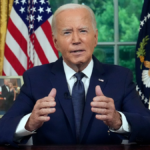USA – Voice of America
WASHINGTON — The U.S. House of Representatives approved legislation Wednesday that would force the popular TikTok video app to either separate from its Chinese-owned parent company ByteDance or sell the U.S. version of the software.
The bipartisan Protecting Americans from Foreign Adversary Controlled Applications Act “gives TikTok six months to eliminate foreign adversary control — which would include ByteDance divesting its current ownership — to remain available in the United States,” said Representative Mike Gallagher, chairman of the House Select Committee on Strategic Competition Between the United States and the Chinese Communist Party, and Representative Raja Krishnamoorthi, the top Democrat on the committee.
“All TikTok would have to do is separate from CCP-controlled ByteDance. However, if TikTok chose not to rid itself of this CCP control, the application would no longer be offered in U.S. app stores. But TikTok would have no one but itself to blame,” the lawmakers said in a prepared statement.
Here’s what we know about the legislation and what happens next in the U.S. Senate.
Why is TikTok under scrutiny?
“The concern is that TikTok could transfer personal information to its parent company ByteDance, who in turn could transfer it to the Chinese government,” Caitlin Chin-Rothmann, a fellow at the Center for Strategic and International Studies, told VOA.
Chin-Rothmann said concerns by some members of Congress about the Chinese Communist Party potentially controlling TikTok’s algorithm for propaganda purposes have not yet been proven.
“That’s not to say that, in the future, there’s not a risk that the Chinese government could exert pressure,” she said.
What does TikTok say about the legislation?
TikTok on Monday called the legislation a “ban” and has repeatedly denied the allegations against it. In a statement last week on X, formerly Twitter, the company said the “legislation has a predetermined outcome: a total ban of TikTok in the United States.”
How do lawmakers view the legislation?
The bill had strong support from House Democrats and Republicans, despite congressional offices receiving floods of phone calls from Americans concerned about losing access to the social media app.
House Speaker Mike Johnson told reporters last week, “It’s an important bipartisan measure to take on China, our largest geopolitical foe, which is actively undermining our economy and security.”
What about the Senate?
The bill could face a much harder road to passage in the Democratic-controlled Senate, where Majority Leader Chuck Schumer has said it will face consideration in the appropriate committees.
“I will listen to their views on the bill and determine the best path,” Schumer said in a statement.
Some Senate Democrats, including Mark Warner, chairman of the Senate Select Committee on Intelligence, have expressed doubts about the legality of singling out a social media app in legislation. He has introduced alternative legislation more broadly targeting apps that collect personal data.
But Warner told CBS News on Sunday that the TikTok app is a serious national security concern.
“If you don’t think the Chinese Communist Party can twist that algorithm to make it the news that they see reflective of their views, then I don’t think you appreciate the nature of the threat,” Warner said.
How do the leading 2024 presidential candidates feel about the bill?
The White House said it welcomes the legislation, even though the Biden campaign joined TikTok recently as an effort to reach out to younger voters.
White House press secretary Karine Jean-Pierre told reporters the bill ensures “ownership isn’t in the hands of those who may do us harm.”
Former President Donald Trump — who initially called for a ban of the app in 2020 — has now changed course, arguing that Facebook will be empowered if TikTok is no longer available.
“There’s a lot of good, and there’s a lot of bad with TikTok. But the thing I don’t like is that without TikTok, you’re going to make Facebook bigger,” the presumptive 2024 Republican presidential nominee told U.S. cable network CNBC in a phone interview this week.
What happens after the bill passes the House?
Apart from constitutional concerns over preventing U.S. citizens from exercising their right to free speech, the bill could also be difficult to legally enforce and face challenges in U.S. courts.
“Chinese export control laws could potentially prevent the sale of TikTok’s algorithm,” Chin-Rothmann said. “A divestiture would be very logistically difficult, in general. TikTok is one of the largest companies in the world. So, any buyer would have to be very large, as well. They would have to have a strategic interest in purchasing TikTok, and then the merger would have to not raise antitrust concerns in the United States.”
Author Profile
Latest entries
 ScienceJuly 26, 2024Brain activity predicts responses to emotional images
ScienceJuly 26, 2024Brain activity predicts responses to emotional images HeadlinesJuly 26, 2024Fox News Poll: Harris, Trump tied in Pennsylvania
HeadlinesJuly 26, 2024Fox News Poll: Harris, Trump tied in Pennsylvania HeadlinesJuly 26, 2024FBI raids $3.5M home of former aide to New York Gov. Kathy Hochul
HeadlinesJuly 26, 2024FBI raids $3.5M home of former aide to New York Gov. Kathy Hochul HeadlinesJuly 25, 2024Politico column takes aim at Biden's 'weakened capacity' to use bully pulpit: 'Half a president'
HeadlinesJuly 25, 2024Politico column takes aim at Biden's 'weakened capacity' to use bully pulpit: 'Half a president'

